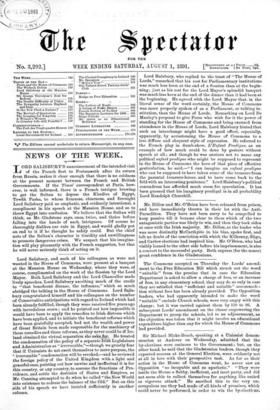Lord Salisbury, and such of his colleagues as were not
-wanted in the House of Commons, were present at a banquet at the Mansion House on Wednesday, where they were, of course, complimented on the work of the Session by the Lord Mayor. Both Lord Salisbury and the Lord Chancellor made lively speeches, Lord Salisbury ascribing much of the credit to "that beneficent disease, the influenza," which so much abridged the talking in the House of Commons. Lord Salis- bury congratulated himself and his colleagues on the number of Conservative anticipations with regard to Ireland which had been already fulfilled, though they were received five years ago with incredulous scorn ; and he pointed out how impossible it would have been to apply the remedies to Irish distress which have been applied, and to initiate the beneficent reforms which have been gratefully accepted, had not the wealth and power of Great Britain been made responsible for the machinery of those remedies and those reforms, as they never could be if Ire- land obtained the virtual separation she asks for. He treated the condemnation of the policy of a separate Irish Legislature and Administration as "irrevocable,"—though we greatly fear that if Unionists do not exert themselves to more purpose, the ‘. irrevocable " condemnation will be revoked,—and he reviewed the foreign policy of the United Kingdom with a light and graceful ease, pointing out how unwise and ineffectual it is for this country, or any country, to assume the functions of Pro- vidence, and settle the destinies of States and Empires, as Mr. Canning attempted to do when he called "the New World into existence to redress the balance of the Old." But on this side, of his speech we have insisted sufficiently in another column.


































